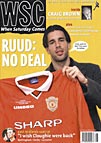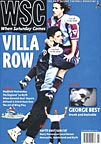 Dear WSC
Dear WSC
Why is Juninho (and any other Brazilian for that matter) referred to as a “samba star”? We don’t call Spanish players “tango stars” or Italians “tarantella stars”. Dennis Bergkamp has never been a “clog dance star” and I haven’t heard Everton fans heralding Joe-Max Moore as their new “hoedown star”. I wonder what foreign journalists call English players. “Morris dance stars” perhaps?
Nigel Ball, Middlesbrough
Search: 'Paul Ince'
Stories
 Craig Brown talks to Jonathan Northcroft about his expectations for Euro 2000 and how is job as Scotland manager is affected by changing trends in international football
Craig Brown talks to Jonathan Northcroft about his expectations for Euro 2000 and how is job as Scotland manager is affected by changing trends in international football
Which countries do you expect to do well at Euro 2000?
If I had to pick a winner, I’d choose France. My top four favourites are France, the Czech Republic, England and Holland – in that order. People might be surprised I’m putting England that high, but I feel that when Kevin Keegan gets his squad away from club distractions, their performances will improve. There’s so much at stake at English club level these days, it’s bound to have an effect. If you’re a Manchester United player, for example, you naturally concentrate on the Champions League and winning the Premiership during the season. Get the players away at the training camp, where Keegan will be very good, where he can get the motivation bubbling up, and it’ll be different. The French have obvious qualities – they won the World Cup with a great team and none of those players has since gone over the hill. Indeed they’ve strengthened their squad by bringing in quality young players like Johan Micoud. Laurent Blanc’s still in great form, aged 34, and Didier Deschamps still battles in midfield. Thierry Henry and David Trezeguet are great striking options. And Zidane is still the man, for me. They’re the closest the world’s got to a complete team: as well as their skills, they’ve got great athleticism and just look at the size of them. The fact they struggled a little in qualifying was just a natural reaction to coming back to earth after winning the World Cup.
 England peaked in 1966, not four years later, as is often believed, says David Montrose
England peaked in 1966, not four years later, as is often believed, says David Montrose
It’s the view put forward in the official history of the England team. It’s what Geoff Hurst thinks. Sir Alf himself supposedly believed it, though I’ve never discovered when and where he said so. And, of course, it’s been the opinion of assorted scribblers. Joe Lovejoy of the Sunday Times, for one, whose contribution to the pre-millennial surfeit of list-making was his assessment of the Greatest Football Teams. Occupying the top five slots, a genuine celebrity parade: Brazil 1970; Real Madrid 1960; Ajax 1972; Brazil 1958; Hungary 1953. Then, England 1970 – outranking the boys of ’66 as well as every team produced by Germany, the Netherlands, Argentina, Italy and France. Praise indeed for a side that lost two out of four.
 Everyone agrees top footballers are playing too many games, except Roger Titford, who can remember when they endured far more without whining. Phil Ball and Neil McCarthy sum up the situation in Spain and France
Everyone agrees top footballers are playing too many games, except Roger Titford, who can remember when they endured far more without whining. Phil Ball and Neil McCarthy sum up the situation in Spain and France
England
Once again, the top clubs are calling for a reduction in the number of fixtures. Arsène Wenger (31 players used already this season) is to the fore of the complaints, while Alex Ferguson’s strategy for managing his club’s 60-game workload is plain to see. “The recovery time is too short,” Wenger said after Arsenal’s defeat at Middlesbrough in March, which followed a midweek UEFA Cup match. “It is nonsense to have only two and a half days of preparation.”
 The north-east produces the players, but it is a cause for wild celebration when one of their own clubs signs them. Harry Pearson looks back on the history of the hotbed
The north-east produces the players, but it is a cause for wild celebration when one of their own clubs signs them. Harry Pearson looks back on the history of the hotbed
Hackneyed ideas surround north-east football as midgies do a busy picnic site. If you find them too irritating it’s best not to go out. On August 6, 1996, two of the more bloated cliches collided with a resounding splat in the Leazes car park at St James’ Park, where 15,000 fans awaited a glimpse of their new signing, Alan Shearer.